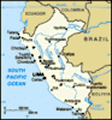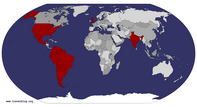Advertisement
Published: October 10th 2015
We ended up in Santa Marianita following decision to engage in more volunteering and making contact with a guest house called The Donkey Den on HelpX. Attracted by the promise of abundant cats and dogs, we made our way from Quito and via Manta to the small fishing village. In recent years it seems to have gained international fame for two key reasons: it is one of the best spots in the region for kitesurfing, and it is one of the best spots in the region for buying land and building property. The tourist industry is steady there as illustrated by the numerous hotels along the beach front, of which The Donkey Den is one, whilst the local community lives in a village about 15 minutes walk from the cluster of resorts.
As volunteers the duties of E and I, as well as varying numbers of other volunteers, involved helping serve breakfast in the mornings and cleaning guest rooms during the afternoon. Other maintenance was occasionally required and evening shifts were there to ensure things ticked over smoothly as guests and other volunteers hung out.
Home to 7 dogs and about 12 cats (but no donkeys), all of which
had been stray at some point in their lives, it was also important to help with looking out for the animals. As you can imagine, being surrounded by 12 was a
cielito (little heaven) for me. Two cats stood out: a scrawny black shorthair female that didn't give a shit about anything including fighting with dogs; and a fluffy white and grey male I came to call Vampire Cat owing to his long fangs and red eyes, with a physical disability that meant he drooled all the time. The dogs were pretty ace too, especially dirty scoundrel Muya whose hyperactivity made her difficult but endearing, and placid Bailey whose body-too-big-for-head and fur colouring made her look like a rotund fox.
The area itself was also home to all sorts of other life. Hermit crabs that scuttled in dizzy paths across the sand and dived into holes as I approached, vultures that eyeballed me as I walked by and were no doubt just waiting for me to drop dead, pelicans seadiving mere metres off the coast, and even howler monkeys in the nearby Pacoche forest. The desert-like environment meant plants were bare and few between but stunning colours could be
found in bright dusks as the Sun set into the Pacific.
Amongst all this are rows and rows of newbuild houses and construction sites. Largely set into the hill rearing up behind the beachfront, the buildings stand in stark contrast to the very plain landscape. White or pastel coloured two-storey residences that I quickly discovered are home to a mostly US retiree population that have chosen Ecuador as home for many different reasons. One of the most common reasons, understandably, is the better cost of living: if you are perhaps treading the middle of the standard of living bell curve in the US, you can live much closer to the high end in Ecuador with the same amount of money. That the national curency is the US Dollar just makes it convenient.
As a volunteer at The Donkey Den you get to meet many - but by no means all - of these expats because the guest house has becomd something of a social hub in the area, with people even travelling from the nearby city of Manta for breakfast. Sundays are the big day for this. Between 20 and 40 people can arrive on Sunday
morning for breakfast and chat, bringing their own pets as well as a bundle of attitude. For Sunday morning volunteers the primary goal is to help Mayra and Adelina - women from the village - in the kitchen, to meet the high volume of breakfast orders whilst also maintaining guest happiness. This latter function often proved to be difficult because Mayra was a one-woman-kitchen, making all of the cooked breakfasts herself, meaning a surge of 10 orders resulted in slower delivery times. Though apparently aware of this as many of the guests had been visiting The Donkey Den for a whole, it was not uncommon to hear from the volunteers serving about grumbles whispered and not-so-whispered concerning the slow service. I thought it was a bit dickish as it displayed little respect not only for volunteers who are not being paid for their work but also for Mayra and Adelina, who worked with limited space and resources to create ace breakfasts. It is a Sunday morning in an Ecuadorian fishing village. What other pressing matters do you have to attend? Certainly they were never desperate enough for breakfast to learn Spanish in order to talk to the staff directly about
their concerns.
I will spare further details; hopefully this small example illustrates the general feeling I got from many of the "expats" living in the area. An overriding sense of assumption due to wealth bound up with unappealing arrogance derived from their nationality. There seemed to be little desire for integration between the expats and locals. Not all the expats there were evil bastards though, or even entirely dislikeable. There was very genuine care amongst many of them for the stray animals of the area - I recognise this as a culturally typical concern of Westerners though, of course - and some could, for example, speak Spanish adequately or fluently. Indeed one of the best people during our stay there was herself an expat. Pam, manager at the Donkey Den, originates from California but has spent the past few years living in Ecuador with her ex-Olympic luger of a husband Bud. Her warmth and wit are a good reminder of the many great people met when we were actually in the US.
During our stay we were also offered the opportunity by an expat couple to housesit for them whilst they were taking a vacation giving us the
opportunity to live in one of those white and pastel coloured houses sitting on the hill. Ten days there, with air conditioning and Netflix and a distinct lack of mosquitoes, was a pleasure. The cat that lived there, Joey, was slightly mad but in a loveable way: he'd feign wanting to be stroked only to grab your fingers and start licking then biting them. He also loved to be by your side constantly. Even in the toilet.
There were other people we met during our stay, too numerous to mention here, who helped shape a relatively relaxed and quiet four weeks in a sandy hotel on the coast of Ecuador. Lisa and John, fellow travellers and volunteers, originally from Sweden, were a cool couple to spend time with. John's interest in hardcore punk meant, much to my surprise, he even knew local Norwich hearththrobs Jackals. Charlie the dog arrived soon after Lisa and John and the connection that Lisa made with Charlie (she ultimately suggested his name) and he with her was lovely to see. I was almost worried they'd be unable to leave without him though they eventually did, with Charlie becoming slightly more loutish following their departure.
Following a night of fake champagne and heated talk-off about the merits of feminism in the modern day West, E and I left early in the morning to make our wah to Cuenca. We left a few dags earlier than planned because we realised that our third anniversary of togetherness was impending and desired to spend it somewhere other than the coastline. Cuenca is a popular tourist and "expat" destination in Ecuador and it is not difficult to understsnd why: cool but not cold climate, plenty of green landscape, colonial architecture, busy but not bustling city centre, etc.
Our three days there were centred around 6th October, the anniversary, a day that saw us kind of accidentally ending up with a beauty spa day. I know. I couldn't quite figure it out myself as we sat there in a steam room. First fake champagne and then a real beauty spa? It felt like I was becoming a bourgeouis sell out. Despite this I somehow managed to enjoy an afternoon sat in warm pools under a cool grey sky, covered in wet clay, or boxed into a body steamer like a medieval torture victim. Neither E nor I could
really remember what we had down for our second anniversary but there's no way we're forgetting this one. In the evening we took a bus tour through the city, which took us up to the mirador overlooking Cuenca, and enjoyed some of the very beautiful natural and manmade features spread out throughout the area. We had intended to end the night at a veggie Indian restaurant called Govinda's but, finding it closed, went to a restaurant in the square and had a jumbo portion of veg fried rice (me) and salad (E) instead.
We left Cuenca on a night bus, as has become a common habit for us, in order to make our way to Peru. We have more special guests arriving in the near future though, coming to meet us in Lima, so our visit to Peru this time is really just a swift bussing through as we head toward the Chilean border. From Cuenca we caught a bus to Chiclayo, a town on the northern Pacific coast, and had our most uncomfortable border crossing to date.
Usually we make our own way across the border. Get a bus to the closest town and the whatever local public transport means to immigration control, get stamped out one side then in the other, then hop on the colectivo or minivan at the other end. Usually very swift and uneventful. To take a coach across the border was a verh different experience. Because it is a nightbus, we pulled into and bailed out toward the immigration office at 1.30am. It became immediately obvious that this wouldn't take the 15 minutes we'd become accustom to when we saw a long line snake out of the building. Several other coachloads of people were being processed too. Ultimately it took the best part of 2.5 hours, with E and I climbing back onto the bus about 4.10am and it leaving 15 minutes later. In the future I think we will stick to DIYing our countryjumping.
Now we are just leaving Chiclayo for a12 hour journey Lima, from where we will probably hop straight onto another bus to the border town of Tacna (22 hours from Lima!) in order to reach Chile and, ultimately the town of San Pedro de Atacama. From there we will take a journey through the world famous and u real looking Salar de Uyuni - the Bolivian salt desert. The idea of 36 hours on a bus is very unappealing but hey! Travelling! Right guys! LOL
PS When is an immigrant not an immigrant? When they're an expat.
Advertisement
Tot: 0.134s; Tpl: 0.012s; cc: 13; qc: 56; dbt: 0.0755s; 1; m:domysql w:travelblog (10.17.0.13); sld: 1;
; mem: 1.2mb










